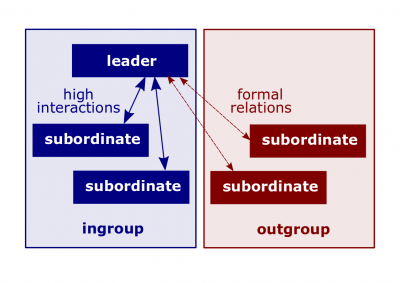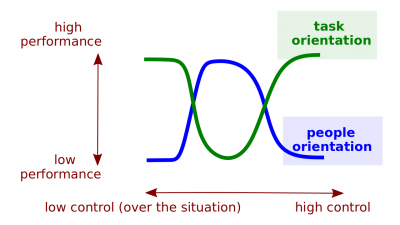Difference between revisions of "Leadership theory"
(Created page with "A leadership theory is any theory that conceptualizes leadership.") |
|||
| Line 1: | Line 1: | ||
| − | A [[leadership theory]] is any [[theory]] that conceptualizes [[leadership]]. | + | A [[leadership theory]] (hereinafter, the ''Theory'') is any [[theory]] that conceptualizes [[leadership]]; in other words, the ''Theory'' is a supposition or a system of ideas intended to explain [[leadership]]. |
| + | |||
| + | |||
| + | ==Classification== | ||
| + | |||
| + | ===Person-focused theories=== | ||
| + | :#Leader-oriented: | ||
| + | :#*Great Man Theory | ||
| + | :#*Emotional Intelligence Theory | ||
| + | :#*[[Charismatic leadership theory]]. A [[leadership theory]] that states that followers make attributions of heroic and extraordinary leadership abilities when they observe certain behaviors. | ||
| + | :#*[[Trait theory of leadership]]. One of theories that consider personal qualities and characteristics that differentiate leaders from non-leaders. | ||
| + | #*[[Behavioral theory of leadership]]. Any [[leadership theory]] that identifies behaviors that differentiate effective leaders from ineffective leaders, as well as differentiate leaders from non-leaders. | ||
| + | #*[[File:Leader-member-exchange.png|400px|thumb|right|[[Leader-member exchange theory]]]][[Leader-member exchange theory]]. The [[leadership theory]] that says leaders create [[ingroup]]s and [[outgroup]]s and those in the [[ingroup]] will have higher performance ratings, less turnover, and greater [[job satisfaction]]. | ||
| + | #*[[Leader-participation model]]. A leadership theory that provides a set of rules to determine the form and amount of participative [[decision-making]] in different situations. | ||
| + | :#Follower-oriented: | ||
| + | :#*[[Attribution theory of leadership]]. A [[leadership theory]] that says that leadership is merely an attribution that people make about other individuals. | ||
| + | :#*Learning Theories | ||
| + | |||
| + | ===Situation-focused theories=== | ||
| + | :'''[[Leadership contingency theory]]'''. | ||
| + | :*[[File:Fiedler-contingency.png|400px|thumb|right|[[Fiedler contingency model]]]][[Fiedler contingency model]]. A model that suggests that effective group performance depends on the proper match between a leader's orientation, whether he or she is [[task orientation|task-oriented]] or [[Human relations orientation|people-oriented]], and the degree to which the situation allows the leader to control and influence. The ''model'' (1) uses a [[least preferred coworker questionnaire]] to classify leaders, (2) assumes that leaders cannot be both [[task orientation|task-oriented]] or [[Human relations orientation|people-oriented]], and (3) suggests that [[Human relations orientation|people orientation]] is the best match to the situations with moderate control, while those leaders who are [[task orientation|task-oriented]] best perform in situations with high or low control. | ||
| + | :*[[Hersey-Blanchard Situational Leadership Theory|Situational leadership theory]] ([[Hersey-Blanchard Situational Leadership Theory]]). A leadership contingency theory that focuses on followers' readiness. | ||
| + | :*Path-Goal Theory | ||
| + | :*Normative Leadership Theory | ||
Revision as of 17:04, 21 January 2021
A leadership theory (hereinafter, the Theory) is any theory that conceptualizes leadership; in other words, the Theory is a supposition or a system of ideas intended to explain leadership.
Classification
Person-focused theories
- Leader-oriented:
- Great Man Theory
- Emotional Intelligence Theory
- Charismatic leadership theory. A leadership theory that states that followers make attributions of heroic and extraordinary leadership abilities when they observe certain behaviors.
- Trait theory of leadership. One of theories that consider personal qualities and characteristics that differentiate leaders from non-leaders.
- Leader-oriented:
- Behavioral theory of leadership. Any leadership theory that identifies behaviors that differentiate effective leaders from ineffective leaders, as well as differentiate leaders from non-leaders.
- Leader-member exchange theory. The leadership theory that says leaders create ingroups and outgroups and those in the ingroup will have higher performance ratings, less turnover, and greater job satisfaction.
- Leader-participation model. A leadership theory that provides a set of rules to determine the form and amount of participative decision-making in different situations.
- Follower-oriented:
- Attribution theory of leadership. A leadership theory that says that leadership is merely an attribution that people make about other individuals.
- Learning Theories
- Follower-oriented:
Situation-focused theories
- Leadership contingency theory.
- Fiedler contingency model. A model that suggests that effective group performance depends on the proper match between a leader's orientation, whether he or she is task-oriented or people-oriented, and the degree to which the situation allows the leader to control and influence. The model (1) uses a least preferred coworker questionnaire to classify leaders, (2) assumes that leaders cannot be both task-oriented or people-oriented, and (3) suggests that people orientation is the best match to the situations with moderate control, while those leaders who are task-oriented best perform in situations with high or low control.
- Situational leadership theory (Hersey-Blanchard Situational Leadership Theory). A leadership contingency theory that focuses on followers' readiness.
- Path-Goal Theory
- Normative Leadership Theory

